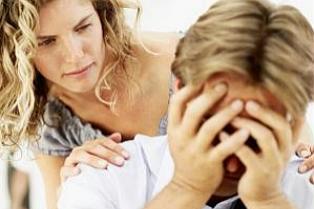Posted on September 18, 2012
The topic of male orgasm is not very common. However, for some men and their partner, a sexual act can be a cause of stress. As opposed to having the problem of ejaculating too early (premature ejaculation or PE), some men find it hard to reach orgasms. This sexual disorder is known as male anorgasmia and can have detrimental effects on the individual and his sexual and sentimental relationships.
Male orgasm: What happens when it’s not possible?

Men who experience male anorgasmia can have full erections, engage in normal intercourse with penetration, and some of them can achieve orgasm through manual or oral stimulation and have “wet dreams” (nocturnal ejaculations while asleep). However, they are not able to experience orgasms during intercourse.
According to the Diagnostic and Statistical Manual of Mental Disorders, 4th Ed. (DSM-IV), male orgasmic disorder (male anorgasmia) is a “persistent or recurrent delay in, or absence of, orgasm, following a normal sexual excitement phase.” Individuals with this disorder can have full erections, engage in normal intercourse with penetration, and some of them can achieve orgasm through manual or oral stimulation and have “wet dreams” (nocturnal ejaculations while asleep). However, they are not able to experience orgasms during intercourse.
Causes of male orgasm problems
Male orgasmic disorder is considered rare. Not many men come forward to report their experiences with their inability to ejaculate. However, these are known causes for the disorder:
- Environmental: Stress, lack of rest, conflicts within the relationship, and performance anxiety (making orgasm the top priority during sex, for instance) can all contribute to impaired ejaculations.
- Psychological: Past sexual trauma, guilt, fear of impregnation, fear of losing control and conflicts within the relationship may cause anorgasmia.
- Medications: Antidepressants can be a leading cause of medication-induced anorgasmia. Many antidepressants have side effects that affect sexual function.
- Lifestyle: Drinking, smoking, recreational drugs and poor health habits can cause anorgasmia.
- Disease: Obesity, cardiovascular diseases, surgery, chronic pain, pulmonary conditions and diabetes, among others, can cause sexual dysfunctions in men.
What to do?

As opposed to having the problem of ejaculating too early (premature ejaculation or PE), some men find it hard to reach orgasms. This sexual disorder is known as male anorgasmia and can have detrimental effects on the individual and his sexual and sentimental relationships. (Shutterstock photos)
- Psychological therapy: Therapy for male orgasmic disorder focuses on eliminating performance anxiety and making sure to focus on a lot of physical stimulation during the sexual act. Find a sex therapist, sexologist or sex coach that can assist you.
- Medications: If the anorgasmia is medication-induced, changing the type of medication can be of help. However, do not decide to do this on your own. Consult with your doctor before starting, stopping or altering prescriptions timings and dosages.
- Masturbation: Focus on masturbation without the goal of reaching an orgasm. Focus on the sensations and the feelings associated with the touch. If you have a partner and feel comfortable, engage your partner in the masturbation sessions. Practice until you feel comfortable and orgasm happens naturally.
- Oral sex: If and or when you are able to ejaculate via masturbation, incorporate oral sex sessions without the goal to orgasm. Enjoy the experience and relax until you are able to orgasm.
- Anal stimulation: For some heterosexual men, the thought of anal stimulation makes them uneasy. However, anal stimulation can be very effective to trigger orgasm due to prostate gland stimulation. As with masturbation and oral sex, start slow until you get used to the sensations.
Male orgasmic disorder or anorgasmia in men can be treated and remedied. Practice, relax and enjoy the ride and you should see improvements.
http://www.voxxi.com/male-orgasm-ejaculation-problem/